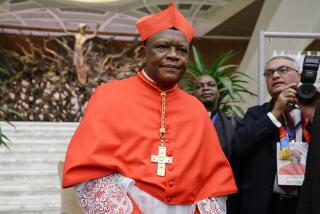Bishops Back Smaller Farms, Adoption of Black Rites
- Share via
BALTIMORE — In separate actions unanimously adopted Wednesday, the nation’s Roman Catholic bishops declared that U.S. agricultural land should be owned by as many small farmers as possible and that black worship styles should be incorporated into more Catholic parishes.
The 300 members of the National Conference of Catholic Bishops, who will conclude their four-day fall meeting here today, also overwhelmingly approved a controversial plan to allow lay men and women to conduct Sunday religious services in remote areas when priests are unavailable.
In their statement on farms, the bishops said the growing concentration of agricultural land in the hands of a few corporations had produced “a farm crisis” and threatened the livelihoods of thousands of U.S. farmers who have lost their land in recent years.
“We need to return the means of production to the greatest number of people possible,” Bishop Thomas J. Connolly of Baker, Ore., said during discussion of the 32-page policy paper.
Anticipating the U.S. Congress’ plan to draft a comprehensive statement on agricultural policy next year, the bishops said such a plan should include “food security as the ultimate goal . . . ensuring that every human being has access to enough food to maintain a decent human standard of living.”
The bishops’ farm statement also asks the federal government to restructure tax and commodity programs to favor small-farm owners, and it urged less dependence on commercial fertilizers and pesticides that pose risks to farm workers and the environment.
The bishops’ plan to evangelize and guide the nation’s 2 million black Catholics affirms the “rich, cultural dimension” of African-American identity, heritage and leadership.
At the same time, the document, “Here I Am, Send Me,” notes that black church leaders must daily confront “issues of injustice, institutional racism, economic oppression, and human exploitation and waste.”
Although he pointed out that the action paper had been in preparation for two years, Auxiliary Bishop John Ricard of Baltimore said “it would be foolish to deny that Father (George) Stallings was a catalyst” for the bishops’ enthusiastic response to the plan Wednesday.
Last summer, Stallings, a maverick black priest, formed an independent temple in Washington, D.C., drawing several thousand black Catholics to his unauthorized weekly services. He has charged that the church hierarchy is unresponsive to the needs of black Catholics and has accused the church of “institutional racism.”
Stallings was not present at the bishops’ meeting here nor was he or his church a part of conference business.
The measure that will allow nuns and lay church members to conduct Sunday worship services in the absence of a priest or deacon drew sharp debate. Some bishops said they were fearful that it would be misinterpreted as giving the laity permission to celebrate Mass without a priest’s being present.
The rites will allow lay persons to lead prayers, preach and distribute Communion wafers only if a priest has consecrated them beforehand. Consecration of the host is a sacramental act reserved for priests to perform and it is the essence of the Catholic Mass.
Although “priestless” Sunday services already occur in 51 dioceses with severe clergy shortages--mostly in Alaska, Wyoming, Texas and Utah--the new rites would standardize the procedures and prayers for the celebrations, according to Bishop Joseph P. Delaney of Ft. Worth, chairman of the Committee on Liturgy.
“We keep insisting, however, that the celebration of the Eucharist (Mass) in every parish every Sunday is our desire,” Delaney said at a news conference before the 225-18 vote favoring the plan was announced.
But retired Bishop William McManus of Ft. Wayne, Ind., was still unhappy. The new rite, he said, “will bless a monster that could destroy the Sunday Mass tradition and Sunday Mass obligation” of U.S. Catholics.
More to Read
Sign up for Essential California
The most important California stories and recommendations in your inbox every morning.
You may occasionally receive promotional content from the Los Angeles Times.










